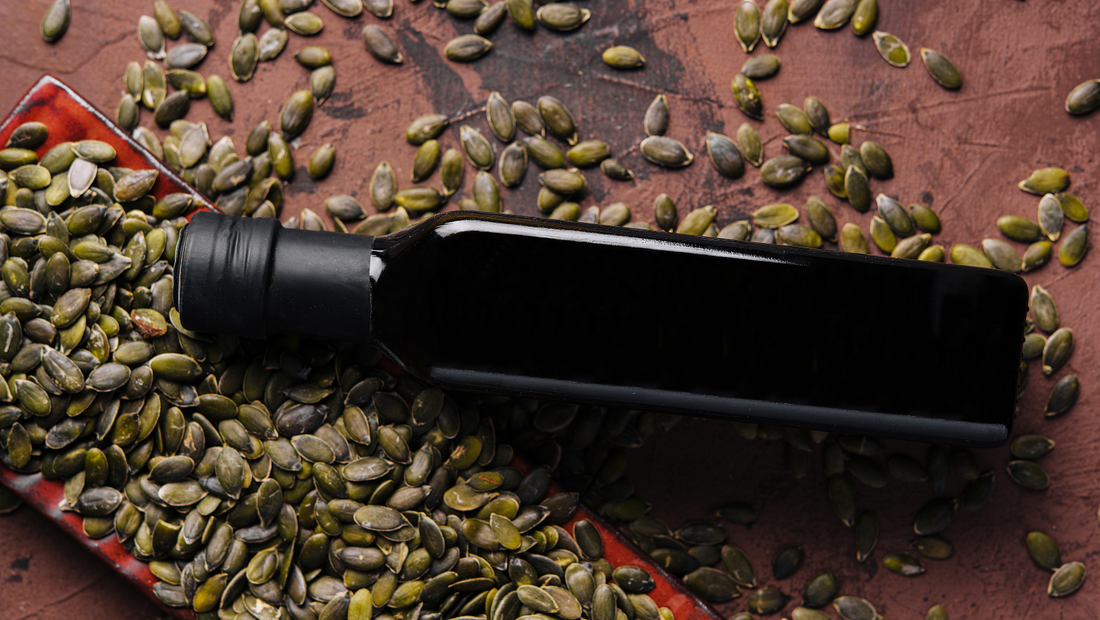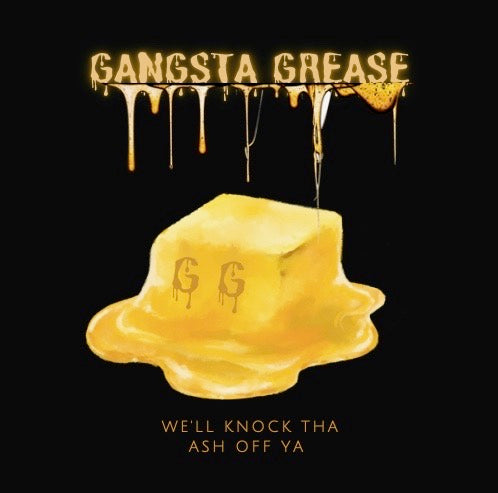
Fall Skincare: Benefits of Pumpkin Seed Oil for Mature and Acne-Prone Skin
Share
Pumpkin Seed Oil
Carrier Oil Series
Whaddup doe? This is article No. 3 in our Carrier Oil Series. We'll be covering the benefits & properties of Pumpkin Seed Oil, and why it should be a staple in your fall skincare routine.
If you missed our last 2 articles in the Carrier Oil Series, make sure to check them out!
For benefits of Coconut Oil for the skin click here, for Benefits of Olive Oil for the skin click here
Pumpkin Seed
Pumpkin seed (Cucurbita pepo) oil is made by extracting the seeds of the pumpkin. It is valued for its wide range of health benefits such as containing antioxidants, having a rich composition of fatty acids and nutrients, it’s hydrating to the skin, can even out tone and has an anti-aging effect. It can even brighten the skin.
As with many carrier oils available, there are different types of pumpkin seed oil. We in particular use Styrian pumpkin seed oil (Cucurbita pepo styriaca) for our products. Styrian pumpkins are grown on the hills of south central Austria, and are grown using organic practices and methods. Organic farming practices contribute to soil health and minimize nutrient losses by using natural nutrient sources, not synthetic fertilizers, pesticides or herbicides. Organic farming helps to both preserve nutritional content and make sure you are not receiving toxic chemicals from dangerous pesticides.
The seeds are a rich, emerald green in color (which can sometimes make the resulting oil appear black). This is due to the bioactive compounds it contains. Rich in antioxidants, pumpkin seed oil contains vitamins A, C, E, K, zinc and other antioxidants to help fight free radicals and protect the skin. The oil is also high in healthy fats and nutrients such as iron, phosphorus, potassium, magnesium, calcium, iodine and carotenoids, and has a higher antioxidant level than many other common edible oils. This is why the oil produced from Styrian pumpkin seeds is referred to as "liquid gold".
According to a study posted by the European Journal of Lipid Science and Technology, Styrian pumpkin seed oil contains about 80% unsaturated fatty acids, with especially high amounts of polyunsaturated acids. The predominant fatty acids include linoleic, oleic, palmitic and stearic acid. Because Styrian pumpkins are harvested in late fall, they contain more linoleic acid, which is an important fatty acid for humans as it helps regulate cellular membranes. Linoleic acid also forms vitamin D and regulates hormones. It is a natural exfoliant and helps reduce hyperpigmentation
Vitamin A: Greatly helps with skin health and improving conditions such as acne, as it exfoliates, removes dirt and dead skin cells to prevent pimples. Vitamin A also has anti-aging effects as it helps stimulate collagen production and smooth wrinkles/fine lines. It also helps to reduce hyperpigmentation or dark spots.
Vitamin C: Helps reduce hyperpigmentation/dark spots, slows down skin aging, smooths out wrinkles and fine lines. Vitamin C is an antioxidant that fights toxins that come from both inside the body and from the environment such as air pollution. It is also anti-inflammatory and helps control sebum production, which is useful for acne-prone skin.
Vitamin E: Increases the skin’s capacity to absorb and retain water. It has both anti-aging effects and the ability to provide some protection against damage from UV light penetrating skin layers.
Vitamin K: Helps speed up skin healing. Vitamin K helps the body heal wounds, swelling, bruises, stretch marks, spider veins, dark spots and stubborn circles underneath the eyes.
Zinc: A major player in fighting against acne - zinc has anti-inflammatory properties, improving skin redness as well as irritation, making it an excellent choice for inflammatory acne. Zinc also reduces the appearance of acne scarring, and regulates oil production.
Iron: Important for healing wounds - encourages the repair of damaged skin
Phosphorus: Important for promoting the growth, maintenance and repair of all tissues and cells.
Potassium: Keeps skin and hair hydrated by protecting from dehydration. Regulates fluids in the body on a cellular level. Balances pH levels of skin.
Magnesium: Regulates cellular regeneration and repair. May help treat dryness, irritation and reduce premature aging.
Calcium: Helps promote glowing skin, it also regulates sebum production. Helps keep skin hydrated and eczema-free. It is a star ingredient in anti-aging, as it helps replenish skin cells.
Iodine: Regulates the skin’s moisture levels. Iodine also aids in healing from wounds, cuts, scars, etc by triggering cellular function in the lower layers of the skin.
Carotenoids: Work to brighten skin tone and protect from sun damage. It also helps to firm the skin, making it an excellent choice for mature skin.
Pros:
- Hydrates and plumps skin
- Better for acne-prone skin, as it regulates oil production
- Improves skin tone
- Rich in antioxidants, such as vitamins A, C, E, and K, as well as zinc, iron, phosphorus, potassium, magnesium, calcium, iodine and carotenoids.
- Great for mature skin, as it is:
- Anti-aging
- Boosts collagen production
- Reduces appearance of fine lines and wrinkles
- Firms skin
- Beneficial for conditions such as eczema and psoriasis
- Bonus: Thickens and strengthens hair, reduces hair loss
Cons:
- Comedogenic rating of 2, meaning it is a moderately low risk and will not clog pores for MOST people.
- As with everything, know what is best for your skin. Always spot test if you are unsure.
- It can cause an allergic reaction if you are allergic to pumpkin
- There are not enough studies to determine whether pumpkin seed oil is safe to be used by pregnant and lactating individuals.
Pumpkin seed oil is definitely a heavy hitter when it comes to both beauty and health, making it an easy addition to your fall skincare routine. With its numerous beneficial qualities, what’s not to love?
Have you ever used pumpkin seed oil before? What effects have you noticed? Let us know in the comments!
